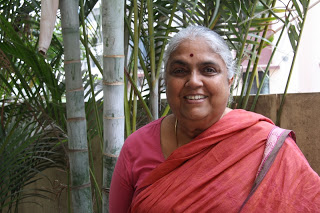Women in the Center of Crop Diversity & Food Security

Women farmers displaying indigenous seeds that they save at a community seed bank in Karnataka.

Dr. Vanaja Ramprasad, founder of the GREEN Foundation
This intimate knowledge of women, believes Dr. Ramprasad is often undermined by the scientific community and biotechnology companies who promote agro-technologies, which might not be appropriate for rural communities, and especially for the economically disadvantaged farmers. Dr. Ramprasad shares that some of the greens on the farms, which poor farmers in India subsist on during lean periods, might be considered as weeds by some agro-companies, which are eliminated by herbicides.
The Foundation programs promote the conservation of agro-biodiversity, ecological farming practices, seed conservation and creation of community-managed seed banks. Seed conservation has been in the center of the programmatic efforts of the Foundation. Their research and analysis showed that India’s Green Revolution in the 1960s eroded the diversity of indigenous seeds with the introduction of the high yielding varieties of seeds and pervasive use of chemical fertilizers and pesticides. As farmers moved away from the practice of saving and exchanging seeds with their neighbors and families to buying the HYV seeds from the market, their own indigenous knowledge systems related to farming and seed saving became slowly irrelevant in the face of industrial agriculture.

Gene bank of indigenous seeds set up by the GREEN Foundation
“India is a land that had over 100,000 varieties of rice,” she says, but now only a few popular varieties are sold in urban markets. The Green Revolution also focused on intensive cultivation of rice and wheat and ignored other indigenous varieties of crops, like millets–considered to be a vital source of nutrition in rural India. The Foundation encourages women farmers to save indigenous varieties of millets, which are ideal crops to grow in arid and semi-arid areas as some varieties are drought-resistant and require little water for irrigation, compared to rice and other cash crops. As small-scale and marginalized women farmers largely depend on the rain for their irrigation needs, millets are an important source of food security in areas where recurring droughts or dwindling and unreliable rainfall cause stress among farmers.
“In many ways, we have to rekindle the pride that the farmers have in their traditional farming systems,” says K. P Suresh, Associate Director of the Foundation. He believes that the traditional role women play in seed selection, seed conservation, and seed treatment to prevent the crop from developing unhealthy, are critical and need to be documented and promoted. Seeds also symbolize the cultural heritage of communities across India, and they are an integral part of many rituals, ceremonies and festivals. And seed conservationists, like Dr. Ramprasad, affirm that the practice of seed saving has been a cornerstone of farming traditions that made agriculture, itself, a way of life.

Well Written Rucha. A friend of mine always said that the chain of healthy food is Gandhi’s spinning wheel of the 21st century.